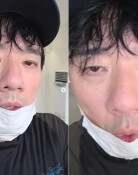Repercussions of President Rohs Remarks in Los Angeles and Europe
Repercussions of President Rohs Remarks in Los Angeles and Europe
Posted January. 18, 2005 23:08,
The Bush administration officials and think tank experts highly regard that Korea and the U.S. had relatively smooth negotiations over the relocation of United States forces stationed in Korea, a year after the issue first emerged in 2004.
They repeatedly stressed that the bilateral cooperation is strong and the two countries would resolve the North Korean nuclear issues through diplomatic means.
However, that was not the case when talking about the meeting on the condition of anonymity or privately.
A think tank official said, mentioning the real names of the high-ranking government officials, They say it is trickier to have a talk with South Korea than with the North.
Is South Korea No Longer Our Ally?-
President Roh Moo-hyuns speech in Los Angeles (November 13, 2004) and remarks during the tour to Europe (December 1 to 7, 2004) escalated mistrust of Korea among U.S. government officials.
An official in the Bush administration said, Anti-proliferation officials expressed an immediate displeasure with President Rohs Los Angeles remark, but State Department officials seemed to understand to a degree. However, when the president made a denouncing remark on the U.S. in France, a country that is at odd with the U.S. these days, even the doves in the administration started to voice their displeasure.
The official also unveiled private e-mail messages traded between the U.S. State and Defense Departments shortly after President Rohs speeches in the Europe tour were released. It is probably because those were private e-mail in which the contents were quite emotional.
President Roh should not expect to be invited to the White House from now on.(Official 1)
We would have admired his courage if he directly had cited the U.S. while making such remarks in Europe. What is the difference between pinpricking our eyes with a stick and indirectly accusing the U.S. North Korea policy in a European country at odd with us? (Official 2)
Alan Romberg, head of the Stimson Center, said, I wonder how effective President Rohs way of expressing his opinion would be.
Professor James Przystup of the National Defense University said, President Roh made such a remark in Europe right after turning back with a smile at the Asia Pacific Economic Cooperation (APEC) summit meeting in Santiago, Chile, which seemed no different from saying that the U.S. is a fool.
Officials in Washington already had a similar feeling when President Roh was invited for a speech at World Affairs Council (WAC) in Los Angeles.
Of course, there was no official response from the Bush administration. Most American media outlets were also quiet. Han Seung-ju, Korean ambassador to the U.S., explained the content of the speech in detail, and Assistant Secretary of State James Kelly reportedly said, We have the same idea. However, the atmosphere was different behind the curtain.
An administration official firmly said, We smile on the stage, but we cannot behind the curtain, adding, We are trying to determine the true meaning of President Rohs speeches, which are not a one-off but repeated message.
A Courageous Diplomacy?-
There were some in the U.S. who interpreted President Rohs remark as an effort to lay the groundwork to strengthen his support base, which is progressive power in Korea.
Furthermore, a private policy advisory group, The Task Force on the Korean Peninsula, of which members include former American ambassadors to Korea Donald Gregg and James Laney, released a report supporting President Rohs North Korea policy, saying that the group is against pressuring the North.
However, it is worth trying to find what effects that the presidents remarks had on the Bush administration when the second term administration will be launched shortly.
Robert Einhorn, a senior advisor of the Centre for Strategic and International Studies (CSIS), expressed a negative sentiment. Knowing well the inner workings of the State Department with experience as an assistant secretary of State for anti-proliferation in the Clinton administration, he pointed out that there are many voices that President Rohs remark in Europe only strengthened the Norths position, adding that it is not desirable to make dovish figures in the administration also turn back on Korea.
He also said, There are complaints that South Korea is no longer on the side of the U.S., but a mediator between the North and the U.S.
Balbina Hwang, a researcher of the Heritage Foundation, said, Due to such situation, there is a prevailing sense of skepticism about an inter-Korean summit in Washington. A source explained that they are skeptical because they think that President Roh is naive and therefore is not suitable for a summit meeting.
David Steinberg, director of Asian Studies of Georgetown University, said, I support the direction of the Sunshine Policy which the Roh administration and its supporters stress, but it is true that the overemphasis on the Sunshine Policy itself put all other issues on the sidelines, adding, Under the circumstance, there surely is a tendency of mistrust of the Roh administration in Washington.
There are also sarcastic voices over the U.S. diplomatic skills.
Larry M. Wortzel, vice president of the Heritage Foundation, said, It only escalates the situation to make a provocative remark just because others have different ideas, adding, Often President Bush and former Under Secretary of State John Bolton made undiplomatic remarks.
Jung-Ahn Kim credo@donga.com




![[김순덕의 도발] ‘李부터 연임’ 개헌, 이 대통령은 가능성을 말했다](https://dimg.donga.com/c/138/175/90/1/wps/NEWS/IMAGE/2026/01/16/133172656.1.jpg)

![“설거지해도 그대로”…냄비 ‘무지개 얼룩’ 5분 해결법 [알쓸톡]](https://dimg.donga.com/c/138/175/90/1/wps/NEWS/IMAGE/2026/01/15/133164664.3.png)
